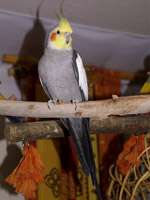Birds and Light
Like most living creatures, birds need light for good health and survival. In fact, compared to most other animals, birds are probably affected most profoundly by changes in light. Aside from the affect on the colors they see, light has a tremendous influence on their growth, metabolism, reproduction, and behavior.
Calcium is one of the most important minerals to a bird's overall health and development. Calcium promotes strong bones as well as the maintenance of many physiological functions. Like humans, birds can suffer life crippling fractures without calcium. Unfortunately, calcium cannot be absorbed by the intestines, nor can its level be regulated, without the presence of vitamin D3. This vital vitamin can be obtained either through the diet or via a process in the skin known as synthesis. The process of synthesis requires ultraviolet radiation of a specific wavelength. The most common source of this radiation is, of course, sunlight. Since normal window glass filters out essential ultraviolet radiation, light coming in through a window cannot stimulate the production of vitamin D3 in your bird's body. So, in a nutshell, your bird needs sunlight, or full spectrum artificial light, for his body to absorb calcium.

Reproductive systems (i.e. egg production, development of gonads, etc.) and sexual behavior are also affected by light. Egg production can be increased by artificially creating longer periods of light, which simulates natural seasonal reproduction cycles. Altering light in a cyclic pattern can also affect sexual development; and interfere with sexual performance. The timing of the reproductive cycle is governed by the length of the daylight hours
[ Search Articles ] [ Article Index ]
